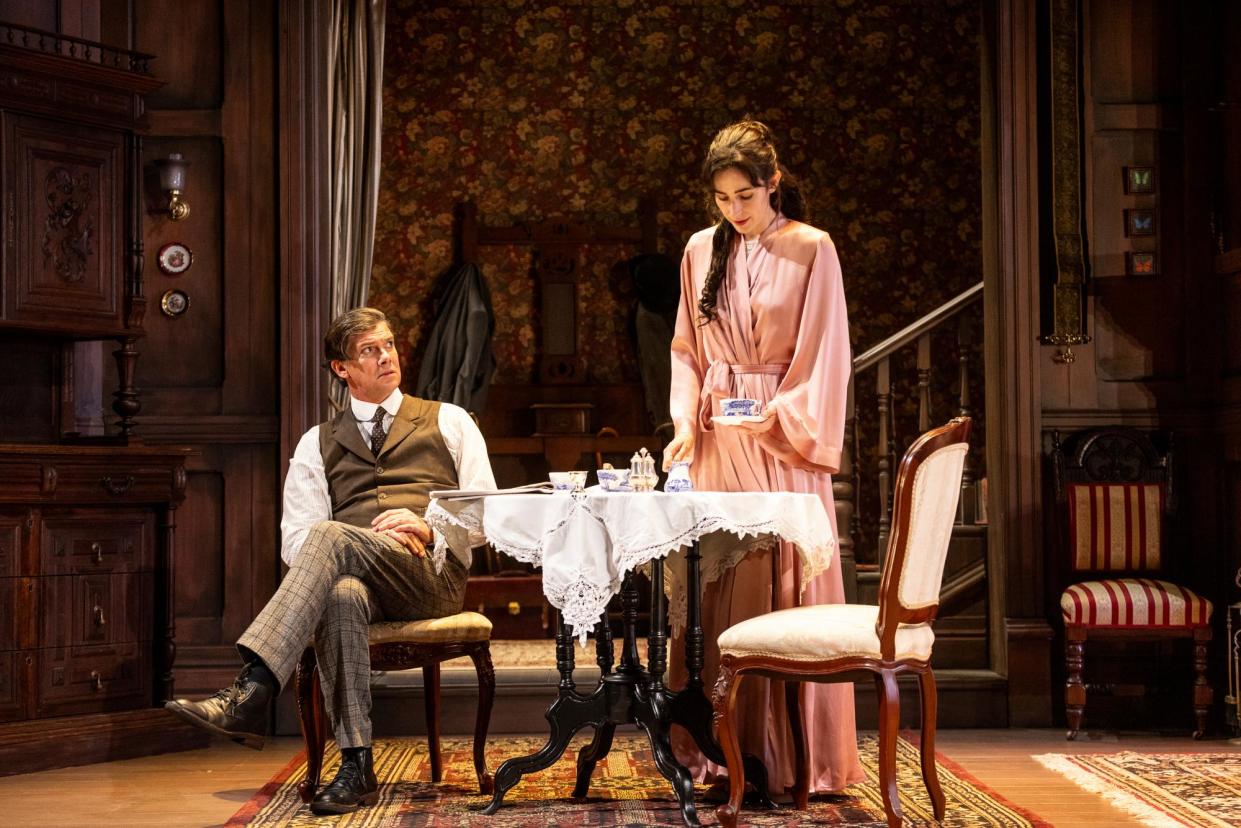Gaslight review – Toby Schmitz and Geraldine Hakewill star in cinematic story of abuse

In the post-MeToo era, the concept of gaslighting – a manipulation tactic to make a victim question their own sanity – has joined the everyday vernacular; in 2022, Merriam-Webster even named it Word of the Year.
But the term itself is far older, originating in Patrick Hamilton’s 1938 play Gas Light, about a man deceiving his wife in order to steal from her. The Victorian melodrama has been adapted many times over the last century, most famously in the 1944 film starring Ingrid Bergman and Angela Lansbury – and now a new adaptation is touring Australia, with Geraldine Hakewill and Toby Schmitz.
First staged in 2022, Canadian playwrights Johnna Wright and Patty Jamieson’s version makes some key changes to the original text, including a reduction from three acts to two; composite characters; and an update on the story’s politics (despite it remaining set in 1901). Helmed by Queensland Theatre Company’s artistic director Lee Lewis, Hakewill and Schmitz play Bella and Jack Manningham, a young couple renting a home in London – where the dutiful, fretful Bella begins noticing thudding sounds in the attic and the titular gaslights dimming, which no one else can hear or see.
At first Jack seems to be a loving husband, concerned about his wife’s supposed descent into madness. Doesn’t she remember that she took a portrait off the wall? Or that she hid her late mother’s pearl necklace? Or that she stole a bracelet at a party? “Stop lying to yourself,” he pleads. “I’m afraid one day I won’t be able to protect you.”
The audience, of course, knows better – Jack is a master of coercive control and Bella his fragile puppet, for reasons that become clearer to the audience, and then to Bella, over the course of the play. Maids Elizabeth (Kate Fitzpatrick) and Nancy (Courtney Cavallaro) provide comic relief – Cavallaro is especially funny as the deadpan cockney newcomer who may or may not be the object of Jack’s affections – but their roles in Jack’s reign of quiet terror also play out subtly. Are they in on it?
Renée Mulder’s Gothic set is intricately laid out like a Victorian sitting room, with credenzas, paintings hanging on the wall, a staircase that serves various functions, and a chandelier that becomes a crucial, and surprising, plot point. Bella’s period costumes are particularly lovely, from a white dress to a deep green gown – the colours become bolder as she develops her steel.
Lighting designer Paul Jackson marks the passage of time through a large, curtain window, where colours change from gold to blue; inside, the gaslights are turned on and off with a ritualistic rhythm.
Paul Charlier’s original score lends an eerie, filmic quality – indeed, there’s something cinematic about the way the story plays out. Unlike recent psychological thrillers on stage, such as the disastrous 2:22, this production grasps the effectiveness of silence as a tool to build unease and suspense. One scene, where all the characters have left and the room stands empty and still, is discomfiting for precisely this reason. The house is a character in itself, ominous and unknowable.
The push and pull between Bella and Jack is convincing in the hands of the two lead actors, who work well together to tease out the intricacies of the relationship. Schmitz is wooden at first, but eases into Jack’s duplicitous Jekyll and Hyde act; a climactic scene where his violence finally turns physical is genuinely horrifying. Hakewill’s range is wonderful, as her delicate, furtive looks give way to wide-eyed horror and eventually determination and rage.
But in this version, Bella’s journey, from meek, subservient housewife to furious independent woman is less nuanced than in the original text. And by doing away with Hamilton’s male detective who helps her piece together the mystery of her life, Wright and Jamieson grant Bella more agency and intelligence: she no longer needs a man to save her.
Giving the character the mindset of a modern feminist makes the play more empowering, and the talented Hakewill’s turn is thrilling to watch – but her defiant speech at the end feels too contemporary for 1901. It leaves the viewer with a sense of cognitive dissonance: if you want to have it this way, why not set it in the modern day?
Hamilton’s prescient ideas about emotional abuse remain as relevant today as ever, and this production has plenty to admire – but the script is too often on the nose, telling rather than showing. What starts as a slow build eventuates in something as subtle as one of the play’s best moments: a frying pan over the head.
Gaslight plays in Melbourne until 24 March, before touring to Canberra, Perth, Newcastle and Sydney


